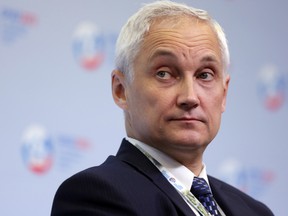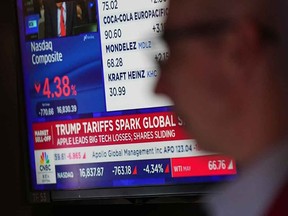Check here for the latest news on how the conflict is affecting markets, businesses and the economy
Article content
Russia’s invasion of Ukraine has sparked unprecedented economic and financial retaliation from western nations which are piling on sanctions in what France has called “all-out economic and financial war.”
Advertisement
This advertisement has not loaded yet, but your article continues below.
Article content
But the conflict will have consequences for the whole world as it cuts off crucial energy and crop supplies, disrupts businesses and upsets financial markets, already under stress as central banks tighten policy.
There is a lot going on out there so check here for the latest news on how the conflict is affecting markets, businesses and the economy.
11:15 a.m.
Companies around the globe grappled with a dilemma over what to do with their Russian investments today as Moscow laid out their options: stay in the country, exit entirely or hand over their holdings to local managers until they return.
First Deputy Prime Minister Andrei Belousov spelt out the government’s position a little more than a week after Russia invaded Ukraine, and a day after French bank Societe Generale sent a chill through the corporate world by saying Russian authorities could seize its assets in the country.
Advertisement
This advertisement has not loaded yet, but your article continues below.
Article content
Belousov outlined three alternatives for foreign firms.
“The company continues to work fully in Russia,” he said in a statement. “Foreign shareholders transfer their share to be managed by Russian partners and can return to the market later,” he added, and: “The company permanently terminates operations in Russia, closes production and dismisses employees.”
No route comes without risks. Those staying could face a backlash in Western markets where the public have rallied to Ukraine’s cause, those transferring shares could be handing over the keys with few guarantees, while those quitting may face a big loss at best, or might have to sell up for a nominal sum.
Read on …
— Reuters
11:08 a.m.
Fears of food security crisis in Ukraine grow
Advertisement
This advertisement has not loaded yet, but your article continues below.
Article content
The United Nations says it is working to stabilize the situation for farmers in Ukraine in an attempt to staunch a growing food security crisis.
Fears about Ukraine’s agriculture sector have driven volatility in global grain markets ever since Russia’s invasion more than a week ago. The region is one of the world’s most important bread baskets, where Ukraine and Russia combine for about a third of all wheat exports, and about 20 per cent of corn exports.
The war has choked off crucial ports in the Black Sea and is displacing farmers in the region — which could disrupt the upcoming planting season, a top EU official said this week.
Before the Feb 24. invasion, Ukraine was already facing a food crisis in the eastern part of the country due to the eight-year conflict with pro-Russian separatists. Roughly 28 per cent of people in the region were struggling with access to food, according to the UN’s Food and Agriculture Organization (FAO).
Advertisement
This advertisement has not loaded yet, but your article continues below.
Article content
“While the evolving situation remains unpredictable, expectations are high of a further deterioration of food security in the east and across the country,” the FAO said in a statement on Friday.
The FAO announced plans to provide cash transfers, seeds and animal feed to farmers a way of protecting “agricultural livelihoods” at a crucial time for Ukraine’s food production. The organization said it needs US$50 million over the next three months to assist up to 240,000 vulnerable people in rural parts of the country.
“When a major supplier of those crops is taken out of the supply chain, the ramifications are substantial. And then there’s the human suffering.” said Alison Blay-Palmer, an associate professor at Wilfrid Laurier University who serves as UNESCO Chair on Food, Biodiversity and Sustainability Studies. “It’s hard to know where to start with this one.”
Advertisement
This advertisement has not loaded yet, but your article continues below.
Article content
Ukraine sets a cap on annual wheat exports as a way of guarding against domestic food shortages. Last fall, after a bumper crop, the country raised its cap to a record-high 25.3 million tonnes of wheat for the 2021/22 growing season, which ends in June. Ukraine’s inability to export wheat and other crops during the invasion will have consequences for the Middle Eastern and African nations that depend heavily on the Black Sea region for food.
World Food Programme (WFP) executive director David Beasley has warned that the “world cannot afford to let another conflict drive the numbers of hungry people even higher.”
Egypt, for example, relies on Russia and Ukraine for 86 per cent of its wheat imports, according to 2020 figures reported by Bloomberg this week. Uncertainty and sanctions on exports from the Black Sea region have driven up global commodity prices, from grains to oil, making it more expensive to source alternatives to Russian or Ukrainian goods.
Advertisement
This advertisement has not loaded yet, but your article continues below.
Article content
WFP depends on the region for half of the wheat used in food relief programs for Yemen, Investment Monitor reported. “It is going have a dramatic impact on food costs, shipping costs, oil and fuel,” Beasley said.
Wheat futures at the Chicago Board of Trade soared past US$12 a bushel on Friday morning, up 6.6 per cent over the previous day’s price for a May contract.
— Jake Edmiston
10:37 a.m.
Most big Canadian companies with business in Russia are quitting the country. Magna International Inc. and Kinross Gold Corp. plan to stop their operations, and Bombardier Recreational Products Inc. and Canada Goose Holdings Inc. say they will stop exporting.
But Laval, Que.-based Alimentation Couche-Tarde Inc., which oversees a global network of service stations and convenience stores, isn’t yet ready to bail on its 320 Russian employees at 38 locations, a company spokesperson said in an email.
Advertisement
This advertisement has not loaded yet, but your article continues below.
Article content
“As our people are our number one priority, we are following the situation closely and continue to support our team members inside and outside Russia,” the company said.
— Kevin Carmichael
10:08 a.m.
No more Ski-Doos for Russia

Another flag carrier from Corporate Canada has decided to quit Russia. Bombardier Recreational Products Inc., the Valcourt, Que.-based maker of Ski-Doo snowmobiles and Sea-Doo personal watercraft, has decided to stop exporting to Russia, which accounts for about five per cent of the company’s sales.
“As always, BRP’s priority is to care for our employees, our dealers, and our valued customers,” a spokesperson said by email. “In the past few weeks and days, we have been monitoring the situation in Eastern Europe very closely. Given the instability of the current situation and the trade complexities, we are pausing our product exports to Russia.”
Advertisement
This advertisement has not loaded yet, but your article continues below.
Article content
BRP has been in Russia for three decades and was at one time the company’s third-biggest market. The international sanctions that followed Russia’s annexation of Crimea in 2014 have significantly reduced BRP’s sales in the country, however. BRP currently has an office in Saint Petersburg that oversees about 100 dealerships.
— Kevin Carmichael
9:37 a.m.
Maersk stops rail shipments between Europe and China
A.P. Moeller-Maersk A/S, the Cophenhagen-based shipping giant, advised its clients this morning that it has temporarily suspended all intercontinental rail shipments — east and west — between Asia and Europe, “without exception.”
Maersk is known primarily for its ships. But it also offers land- and air-based options. Among other things, Maerk’s website lists a “block train” option that allows customers to book a train of their own to move goods between China and Europe. Alas, the tracks run through Russia.
Advertisement
This advertisement has not loaded yet, but your article continues below.
Article content
The decision reinforces warnings that the war in Eastern Europe will have a ripple effect on shipping costs around the world.
“If you have cargo currently in transit or have completed a booking before this suspension was announced, we will do our utmost to get it delivered to its intended destination across the normal routes,” Maers said in a customer advisory. “The latest sanctions also mean Maersk has suspended all new air bookings to and from Russia and Ukraine until further notice. We do see a potential risk to the cost of air transportation, as airspace gets restricted and flights are further subject to rising fuel and insurance costs.”
Maersk also advised its customers that it had decided to limit its dealings with Belarus, in part because of sanctions visited on Russia’s ally in its invasion of Ukraine, and partly for moral reasons.
Advertisement
This advertisement has not loaded yet, but your article continues below.
Article content
“For Belarus, going forward, only bookings for foodstuff, medicines, and humanitarian supplies (except dual use) will be accepted after extensive screening,” the company said. “This exemption is to underline that Maersk is focusing on social responsibility and making the efforts to support society despite the complications and uncertainties within the current supply chain.”
— Kevin Carmichael
9:32 a.m.
North American stocks are in the red this morning as concerns over the intensifying conflict in Ukraine overshadowed data that showed an acceleration in U.S. jobs growth last month.
The Dow Jones Industrial Average fell 139.23 points, or 0.41 per cent, at the open to 33,655.43.
The S&P 500 opened lower by 21.37 points, or 0.49 per cent, at 4,342.12, while the Nasdaq Composite dropped 82.71 points, or 0.61 per cent, to 13,455.23 at the opening bell.
Advertisement
This advertisement has not loaded yet, but your article continues below.
Article content
The TSX composite index was down 42.34 points, or 0.2 per cent, at 21,208.07.
8:30 a.m.
Magna International Inc., Canada’s biggest maker of automobile parts, has changed its mind about trying to hang on in Russia.
As other multi-nationals headed for the exits, the Aurora, Ont.-based company said on March 1 that it planned to keep its six factories open, and its 2,500 Russian employees working. That stance lasted about two days.
“Like most in the international community, we remain deeply concerned with the very unfortunate situation in Ukraine,” Tracy Fuerst, vice-president of corporate communications and public relations, said in an email. “Given current conditions, Magna is idling its Russian operations.”
Magna will make a “significant” donation to the UN Refugee Agency and will match any donations that its workers make towards the “well-being and safety” of Ukrainians.
“Although we don’t have facilities in Ukraine, we have the privilege of working with thousands of Ukrainian colleagues in our Magna operations around the world as well as those from Russia who share the same values of human rights, diversity and inclusion,” Fuerst said.
— Kevin Carmichael
Additional reporting by Reuters, Bloomberg
Advertisement
This advertisement has not loaded yet, but your article continues below.
Ukraine updates: how conflict is impacting the world economy
2022-03-04 16:31:23





